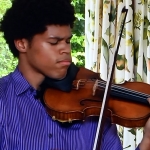The Editor’s Blog 2011

Here’s a news piece about the BBC Sounds of 2011 List:
Rory Connolly | 22:25 UK time, Friday, 3 December 2010
The hotly anticipated Sound of 2011 longlist was announced this morning. Radio 1 and 1Xtra’s head of music George Ergatoudis shares his thoughts on the list:
The BBC’s ‘Sound Of’ survey first emerged in 2003, the brainchild of BBC entertainment news reporter Ian Youngs. It has one purpose: to find the best up-and-coming artists to watch out for in the following year. There are many lists of hotly tipped acts, but I believe the BBC’s ‘Sound Of’ list now stands out as the definitive one, thanks to the rigor applied to its compilation and its comprehensive range of contributors including taste makers from radio, TV, newspapers, magazines and online. Over the years it has helped music fans discover some fantastic artists and while some have disappeared without a trace there have also been notable successes including Dizzee Rascal, Keane, the Kaiser Chiefs, Plan B, Adele and Florence And The Machine, to name just a few.
Of course the future is always cloudy and the list has to be taken for what it is: a snapshot of predictions from one moment in time. In reality the job of identifying and supporting exciting new artists is never-ending and the presenters and production talent who work on the BBC’s music services (online, radio and TV) are always tirelessly seeking out the next big thing. But, as a music fan, I personally get very excited by the annual unveiling of the Sound Of list. There are always entries that I personally take issue with and of course
omissions, but at least it inspires passionate debate. Music is an art form and there’s simply no way every one is going to agree, no matter how many so-called experts have been involved.
So the Sound Of list is great fun for music fans, but of course it’s a serious matter for the artists themselves. It increases the pressure of expectation, but equally it presents a brilliant opportunity to get widespread exposure. The secret is not to rush. Sure, a nod on the list is great, but my advice to artists and labels is to make sure you’re genuinely ready with the best material you can possibly deliver. Timing is everything. Rushing a project just to capitalize on the exposure is nearly always going to prove fatal in the long run.
2011 looks like another exciting year for music, with some significant changes set to shake up the whole business. At the end of the year it will be fascinating to take stock and see what has happened to the 15 talented artists who made the final long list. I wish them all the best of luck.
George Ergatoudis is the Head Of Music at BBC Radio 1 & BBC 1Xtra
So, he’s excited by the list but in the same breath states that it’s only “a snapshot of predictions from one moment in time.” He also states, “In reality the job of identifying and supporting exciting new artists is never-ending and the presenters and production talent who work on the BBC’s music services (online, radio and TV) are always tirelessly seeking out the next big thing.”
THE NEXT BIG THING
George, you have a high-powered, highly paid job but your music antennae needs serious servicing. Why, for example, are you always on the lookout for THE NEXT BIG THING? Surely the job of your staff is to seek out great music regardless of its size, age and potential? “…but my advice to artists and labels is to make sure you’re genuinely ready with the best material you can possibly deliver. Timing is everything. Rushing a project
just to capitalize on the exposure is nearly always going to prove fatal in the long run.” And how dare you patronise acts and the public in this way… Perhaps you should read what your PR people have written for you… “So the sound-of list is great fun for music fans, but of course it’s a serious matter for the artists themselves…” George, do you not realise that there are numerous high quality acts out there producing very fine music who are never included on your fucking lists and never secure a moment of airplay. Just take a look at our Top Albums of 2010 list and ask yourself how many of these acts have received any airtime on your stations. Most are not looking to be the next big thing, they just want their music to be heard; they want to keep playing, to survive.
COMMERCIALISM
The BBC is funded by everybody in the UK who watches live TV. Each pays the BBC a licence fee of £145 per annum. If you don’t pay you are fined and may even be jailed. So the BBC is not a commercial broadcaster unlike others who rely on advertising and pay-for-view income. The BBC receives billions each and very year from the UK population, plus another billion from programme sales. It is called a PUBLIC SERVICE BROADCASTER, yet we know little of what it does, spends, thinks, plans. For example, how much money is being spent on exercises like this and the increasing range of live events the BBC puts on? But more importantly, is Radio 1 representing the broad range of fine talent and the tastes of the UK public in what it plays? It is not obliged to compete with other stations or via its monopoly of the airwaves influence others in what to play, and ultimately what sells at retail level. The BBC is not obliged to flog the same songs day-in, day-out, for months on end (via its A, B, C Playists). IT HAS TO PLAY IT FAIR AND OPENLY.
THE FINAL 15 Sounds Of 2011
Anna Calvi
Clare Maguire
Daley
Esben & The Witch
Jai Paul
James Blake
Jamie Woon
Jessie J
Mona
Nero
The Naked & Famous
The Vaccines
Warpaint
Wretch 32
Yuck
Here’s a question for you George: Why has Blake, Jessie J, and Nero from this short-list already been played extensively for many months on Radio 1 in 2010, if they are supposed to be the sounds of 2011? I’ve often heard the word ‘championing’ used by R1 presenters but is it really a public service’s role to show bias towards artists and in so doing provide them with a massive advantage over their competitors, many of whom receive no airplay?
EMMA GILLESPIE AKA EMMA’S IMAGINATION
Oh dear! I read the 2-page Sunday Times feature on the winner of Sky’s excellent music talent contest, and my heart sank. She has signed with Gary barlow’s label and it seems has succumbed to turning stripped-down acoustic beauty to the full-scale orchestral treatment. Or, more accurately adapedted for BBC R1 airplay. What Emma has missed is the highly paid (large) team of people now working on her behalf will be paid out of her efforts and income. Already fans are complaining that the new versions of old songs are awful… SHIT!
BACK TO GEORGIE BOY…
“There’s something of an increase in pop acts that I think are making really strong, quality new music. Ones doing really well for us at the moment are the Hoosiers, Scouting for Girls, the Wombats … it depends how far you want to stretch the definition of pop, but you could argue that acts like the Kaiser Chiefs and Pigeon Detectives are making such melodic music you could call them pop.” In other words, Radio 1 - whose remit is to break new music - will be throwing a large part of its considerable weight behind soft-rock outfits who owe
their existence to the Feeling.
And, though Ergatoudis denies it, industry rumour has it that the station will concurrently scale back the number of rockier acts it playlists, which could be bad news for the plethora of guitar groups, such as the Twang and the Enemy, who have been the face of new UK music for the past year. Though he claims the playlist will still feature “the best new [guitar] music”, he hedges: “You could say that a certain sound of guitar music is sounding less innovative and interesting.” One major-label publicist isn’t surprised to hear it. “Straightforward rock bands without a quirky twist seem dull in 2008. The market has shifted, and you need to have bells and whistles now. Or maybe it’s to do with [these bands] being cheerful.” (WHAT TOTAL VERBAL SHITE!)
THERE’S MORE…
The politics of playlist Radio play is still hugely important for bands wanting to find their audience. I spoke to Radio 1’s head of music about how a playlist is put together. The internet has been revolutionary in providing a platform for unsigned and niche artists. Though some people have declared this the demise of radio, judging by the sales charts, it seems getting playlisted on national radio is still incredibly important in reaching the
biggest possible audience.
The playlist is the guide to what songs a radio station will play at any given time. I wanted to find out exactly who decides what songs get on there and how they reach that decision, so I chatted to George Ergatoudis, the head of music at Radio 1, arguably home to the most powerful playlist of them all.
I began by asking him what he would say to people who accuse Radio 1 of catering to major labels.
That’s absolutely not true, If you ask AIM, they’re very satisfied with how we support independent labels. If you look at the specialist shows, they are fundamentally driven by independent music. 70% - possibly higher - of the music is from independent and bedroom labels.
How often does that music break into the regular playlist?
All the time. Every week. Take one of the biggest indie labels, XL of the Beggars Group; rarely a week goes by when there’s not at least one or two of their artists on the Radio 1 playlist.
So how do you decide who gets on it?
As head of music, I obviously carry the cap, in particular when it comes to mainstream music. I have a team of four people who are dedicated to listening to music all the time, going to gigs, looking at what’s going on online and communicating with the audience. On top of that I have a hand-picked team of 10 people that I have a look at every six months, within Radio 1. And we all come together once a week for a playlist meeting where we go through 20 to 30 records. There’s obviously been a filtering process before that, since there are
200 to 400 releases a week, potentially. If we used the MySpace model, which we don’t, way more than that.
The people at the meeting are all there because I believe they have an area of expertise. I also use them as a model or our wider audience in terms of a mix of 50/50 women and guys with a few age differences. Some are mainstream, others are niche. I also have, and this is fundamental, a separate filtering process that feeds into the Wednesday meeting. I meet with the guys from the specialist shows on Tuesdays, since I believe they are absolute tastemakers and I want to capture their radar system. One week it’s rock/indie/alternative, the next it’s dance and urban. I think that’s enough.
How many slots for new music are there per week?
There are roughly 50 current records on rotation on the mainstream playlist every week. We turn over six to 12 records per week. It depends on what time of year and how much music is on the market. Recently, we’ve been turning over a lot of records since there’s a lot of music out there. As a result, their lifespan on Radio 1 might not be as long as it could be at a quiet time of the year. We don’t hang around on records, even the most successful ones, in the way commercial radio does. They have to play it safe. They need records that have already connected with the market so that their listeners stay happy with what their product is. We’re breaking those records. This has become an incredibly complex world full of so much choice. You need a filter. Where do you turn? Where do you go? To Radio 1. That’s what we do and will keep doing. Then again, if you’re relentlessly new, relentlessly difficult and niche, the mass market won’t come to you. So we balance it very carefully.
My main points and questions are:
- The BBC is showing extreme commercial bias to a limited range of acts via incessant, long-term airplay.
The temptation, indeed absolute requirement for radio pluggers and record label executives is to present singles created specially for R1 and R2 airplay. It’s effectively a dumbing-down process (Bullet For My Valentine’s song is a prime example). - While the BBC Sounds of 2011 is hyped to hell, the boss admits it’s a “snapshot of predictions from one moment in time…”. So why the fuck do it? Why commit R1to this music when you don’t know what’s coming? What really is the point? And won’t this list deflect attention from acts not selected that will appear in 2011?
- Why is the BBC so impressed and influenced by a single song, and where is the quality control (see above Jessie J and Nero examples).
- The BBC is setting itself up as arbiter, ’she who must be obeyed’, and the major influence in music. This is totally wrong, misguided, and not within the licence remit. In effect it has become a music monopoly despite its overall abject mediocrity and public service remit.
- Instead of “In New Music We Trust” why not “In Great Music We Trust”?
- Why the heavy reliance on single releases when many of the best songs are left on an album? Why not select the best songs from an album as they do in the USA (called ‘OUT OF THE BOX’ tracks)?
- Why is the choice of music so prescriptive and so reliant on what Georgie thinks? And how can a team of just 4 people possibly hear what’s going on release and live wise, and what role do presenters play in selecting songs to play?
- How can bands like The Enemy possibly be ignored by Georgie and Radio 1 - that is absolutely beyond me and many others.
- Stop relying on so-called “tastemakers” and learn to listen to “music-lovers” with experience and eclectic tastes. And start to recognise that the consumer is a lot more savvy than you think.
- The BBC is guilty of abusing its position as the country’s only national radio network, of showing bias towards certain artists and not providing airplay exposure to many highly talented acts, many of which sell-out concerts venues whenever they play. And many new acts go undescovered and unplayed due to the larger budgetted PR campaigns from other acts rendering them ’more visible’.
- BBC Introducing is a bad joke.
- All the BBC R1 daytime presenters chose 2010 playlisted R1 songs as their top 40 of the year. Don’t they listen to anything else…?
For the first time BBC R1 is about to face a commercial national FM network competitor and the only saving grace is that the competitor’s playlist is worse (if that were possible!). I see Capital FM waking up to this but I also see Internet and Satellite broadcasters very slowly but steadily showing the way. I listened to R1 today for their well-trailed presenter changeover/takeover and found the output only marginally better from these so-called ’specialists’ including Zane Lowe. What really bugs me is that R1 could be a world beater and for less than half its current budget of well over £200 million. At the heart of such a winner must be great content and people which right are only found in much smaller broadcasters I know like Australia’s JJJ and certain USA Public stations.
|
|

|

Simple Minds |
LATEST GALLERY IMAGES

Where Israel Goes, Misery Follows 
The Kanneh-Masons |
|
|

